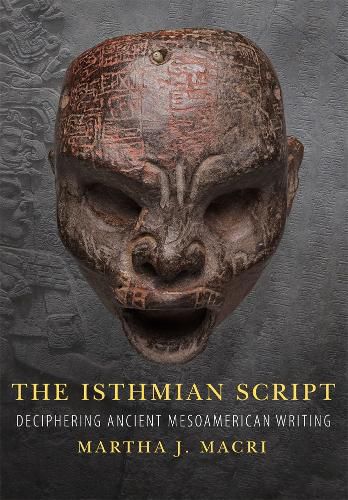Readings Newsletter
Become a Readings Member to make your shopping experience even easier.
Sign in or sign up for free!
You’re not far away from qualifying for FREE standard shipping within Australia
You’ve qualified for FREE standard shipping within Australia
The cart is loading…






The Isthmian script, sometimes called Epi-Olmec, first came to the attention of scholars through inscribed texts on the Tuxtla Statuette and the La Mojarra Stela, both discovered in Veracruz, Mexico. In The Isthmian Script: Deciphering Ancient Mesoamerican Writing, linguist Martha J. Macri provides the most comprehensive account ever given of this ancient script and the tantalizing clues it holds for pre-Maya culture. While the Olmec culture of the Gulf of Mexico, among the oldest known in Mesoamerica, clearly inspired the artistic motifs and iconography of the region, Macri argues that on the basis of evidence from sculptural traditions farther to the south, the Isthmian script proper originated in Chiapas and Guatemala, not in the Olmec centers of San Lorenzo and La Venta.
Challenging a previous claim of full decipherment announced in the journal Science in 1993, Macri uses structural analysis and comparative iconography to demonstrate that the Isthmian script, even without a word-for-word decipherment, affords a wealth of data about the origins of Mesoamerican scripts and about interactions between Mixe-Zoquean and Mayan speakers during the Middle to Late Preclassic period (900 BCE-100 CE). This richly documented study offers observations on specific signs as a starting point for further research, providing data in support of the author's hypotheses and spelling out clearly what is still not known.
With valuable new insights into the linguistic prehistory and the iconography on stone sculpture in Mexico and Guatemala, Macri's work calls for a new generation of investigators into the Isthmian script and inspires a renewed interest in the process of script invention among early Mesoamerican peoples.
$9.00 standard shipping within Australia
FREE standard shipping within Australia for orders over $100.00
Express & International shipping calculated at checkout
Stock availability can be subject to change without notice. We recommend calling the shop or contacting our online team to check availability of low stock items. Please see our Shopping Online page for more details.
The Isthmian script, sometimes called Epi-Olmec, first came to the attention of scholars through inscribed texts on the Tuxtla Statuette and the La Mojarra Stela, both discovered in Veracruz, Mexico. In The Isthmian Script: Deciphering Ancient Mesoamerican Writing, linguist Martha J. Macri provides the most comprehensive account ever given of this ancient script and the tantalizing clues it holds for pre-Maya culture. While the Olmec culture of the Gulf of Mexico, among the oldest known in Mesoamerica, clearly inspired the artistic motifs and iconography of the region, Macri argues that on the basis of evidence from sculptural traditions farther to the south, the Isthmian script proper originated in Chiapas and Guatemala, not in the Olmec centers of San Lorenzo and La Venta.
Challenging a previous claim of full decipherment announced in the journal Science in 1993, Macri uses structural analysis and comparative iconography to demonstrate that the Isthmian script, even without a word-for-word decipherment, affords a wealth of data about the origins of Mesoamerican scripts and about interactions between Mixe-Zoquean and Mayan speakers during the Middle to Late Preclassic period (900 BCE-100 CE). This richly documented study offers observations on specific signs as a starting point for further research, providing data in support of the author's hypotheses and spelling out clearly what is still not known.
With valuable new insights into the linguistic prehistory and the iconography on stone sculpture in Mexico and Guatemala, Macri's work calls for a new generation of investigators into the Isthmian script and inspires a renewed interest in the process of script invention among early Mesoamerican peoples.